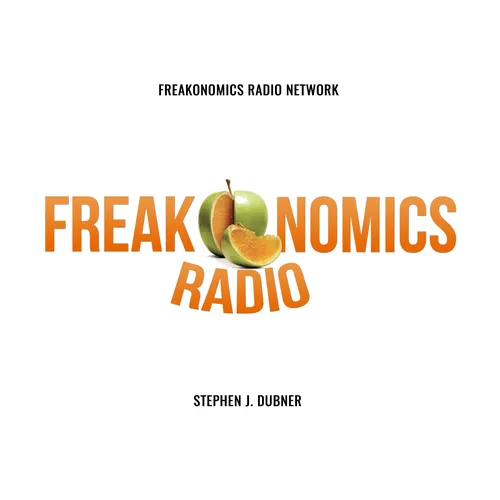
Freakonomics Radio
Freakonomics co-author Stephen J. Dubner uncovers the hidden side of everything. Why is it safer to fly in an airplane than drive a car? How do we decide whom to marry? Why is the media so full of bad news? Also: things you never knew you wanted to know about wolves, bananas, pollution, search engines, and the quirks of human behavior.
To get every show in the Freakonomics Radio Network without ads and a monthly bonus episode of Freakonomics Radio, start a free trial for SiriusXM Podcasts+ on Apple Podcasts or by visiting siriusxm.com/podcastsplus.
- Update frequency
- every 5 days
- Average duration
- 41 minutes
- Episodes
- 857
- Years Active
- 2010 - 2025

488. Does Death Have to Be a Death Sentence?
In this special episode of People I (Mostly) Admire, Steve Levitt speaks with the palliative physician B.J. Miller about modern medicine’s goal of “protecting a pulse at all costs.” Is there a better…

487. Is It Okay to Have a Party Yet?
In this special episode of Freakonomics, M.D., host Bapu Jena looks at data from birthday parties, March Madness parties, and a Freakonomics Radio holiday party to help us all manage our risk of Covi…

486. “The Art Market Is in Massive Disruption.”
Is art really meant to be an “asset class”? Will the digital revolution finally democratize a market that just keeps getting more elitist? And what will happen to the last painting Alice Neel ever ma…

485. “I’ve Been Working My Ass Off for You to Make that Profit?”
The more successful an artist is, the more likely their work will later be resold at auction for a huge markup — and they receive nothing. Should that change? Also: why doesn’t contemporary art impac…

484. “A Fascinating, Sexy, Intellectually Compelling, Unregulated Global Market.”
The art market is so opaque and illiquid that it barely functions like a market at all. A handful of big names get all the headlines (and most of the dollars). Beneath the surface is a tangled web of…

How Do You Cure a Compassion Crisis? (Ep. 444 Replay)
Patients in the U.S. healthcare system often feel they’re treated with a lack of empathy. Doctors and nurses have tragically high levels of burnout. Could fixing the first problem solve the second? A…

483. What’s Wrong With Shortcuts?
You know the saying: “There are no shortcuts in life.” What if that saying is just wrong? In his new book Thinking Better: The Art of the Shortcut in Math and Life, the mathematician Marcus du Sautoy…

482. Is Venture Capital the Secret Sauce of the American Economy?
The U.S. is home to seven of the world’s 10 biggest companies. How did that happen? The answer may come down to two little letters: V.C. Is venture capital good for society, or does it just help the …

481. Is the U.S. Really Less Corrupt Than China?
A new book by an unorthodox political scientist argues that the two rivals have more in common than we’d like to admit. It’s just that most American corruption is essentially legal.

480. How Much Does Discrimination Hurt the Economy?
Evidence from Nazi Germany and 1940’s America (and pretty much everywhere else) shows that discrimination is incredibly costly — to the victims, of course, but also the perpetrators. One modern solut…

479. The Economist’s Guide to Parenting: 10 Years Later
In one of the earliest Freakonomics Radio episodes (No. 39!), we asked a bunch of economists with young kids how they approached child-rearing. Now the kids are old enough to talk — and they have a …

478. How Can We Break Our Addiction to Contempt?
Arthur Brooks is an economist who for 10 years ran the American Enterprise Institute, one of the most influential conservative think tanks in the world. He has come to believe there is only one weapo…

477. Why Is U.S. Media So Negative?
Breaking news! Sources say American journalism exploits our negativity bias to maximize profits, and social media algorithms add fuel to the fire. Stephen Dubner investigates.

That’s a Great Question! (Ep. 192 Rebroadcast)
Verbal tic or strategic rejoinder? Whatever the case: it’s rare to come across an interview these days where at least one question isn’t a “great” one.

“This Didn't End the Way It’s Supposed to End.” (Bonus)
The N.B.A. superstar Chris Bosh was still competing at the highest level when a blood clot abruptly ended his career. In his new book, Letters to a Young Athlete, Bosh covers the highlights and the s…

476. What Are the Police for, Anyway?
The U.S. is an outlier when it comes to policing, as evidenced by more than 1,000 fatal shootings by police each year. But we’re an outlier in other ways too: a heavily-armed populace, a fragile ment…

475. Why Does the Richest Country in the World Have So Many Poor Kids?
Among O.E.C.D. nations, the U.S. has one of the highest rates of child poverty. How can that be? To find out, Stephen Dubner speaks with a Republican senator, a Democratic mayor, and a large cast of …

474. All You Need Is Nudge
When Richard Thaler published Nudge in 2008 (with co-author Cass Sunstein), the world was just starting to believe in his brand of behavioral economics. How did nudge theory hold up in the face of a …

Is There Really a “Loneliness Epidemic”? (Ep. 407 Rebroadcast)
That’s what some health officials are saying, but the data aren’t so clear. We look into what’s known (and not known) about the prevalence and effects of loneliness — including the possible upsides.

473. These Jobs Were Not Posted on ZipRecruiter
In a conversation fresh from the Freakonomics Radio Network’s podcast laboratory, Michèle Flournoy (one of the highest-ranking women in Defense Department history) speaks with Cecil Haney (one of the…